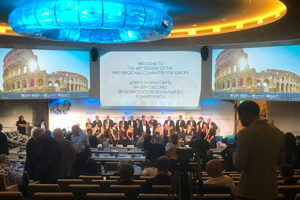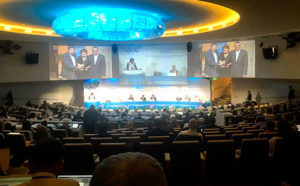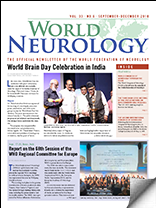Sept. 17-20, Rome, Italy
By Wolfgang Grisold
The World Federation of Neurology (WFN) is a global non-state actor, and has the possibility to participate in the regional WHO meetings. As with last year in Budapest, the WFN was represented this year by Wolfgang Grisold in Rome.

Opening ceremony: choir sings Italian music, ending with Verdi`s Nabucco
The meeting took place in the governmental sector of Rome (Auditorium della Tecnica, Viale Umberto Tupini 65) and was opened by high ranking Italian politicians, including the prime minister and the health minister. The WHO was represented by Tedros Adhanom Ghebreyesus, director general, and Zsuzsanna Jakab, WHO regional director for Europe.
The WFN was able to make a statement, this time on stroke. This statement can be found on the WHO website and was jointly made with the World Stroke Organization (WSO), the European Stroke Organization (ESO), and the European Academy of Neurology (EAN).

Opening speech with Zsuzsanna Jakab, WHO Regional Director for Europe.
An oral statement was also delivered by Francesca Pezzella, a representative from the ESO. It states the importance of stroke, as endorsed by four large specialist societies. This statement may be useful in the regional context for WFN member states to further emphasize the importance of stroke treatment.
The main program points were:
- Affordability of medical services
- Vector borne diseases and vaccination
- Non-communicable diseases (NCDs)
- Men’s health
- Budget program
In this report, the topics relevant for neurology will be discussed.
“No one left behind“ is a self-explanatory motto of this year to describe that all persons in European countries should have access to health coverage. Despite the fact that Europe is one of the richest regions in the world, a large disparity of out of pocket costs for patients exists. In summary, in those countries in Europe that are the poorest, the percentage of self payment and individual payment (out of pocket) is highest.
Whether people can afford to pay for health care is a question of growing importance, and varies greatly in European regions. It is alarming that some health costs, for example, dentistry, are not covered at all in some countries.
The wish and recommendation is the move toward a European health plan, with health coverage of EU citizens. Residual and out of pocket payment need to be reduced or ideally abolished.
An action plan to improve public health preparedness and response in the WHO European Region is on the way. Turkey was specifically mentioned in this WHO meeting. This country is providing free medical care for more than 3 million Syrian refugees, which was greatly acclaimed by the delegates.
Vaccine-Preventable Diseases and Immunization: Realizing the Full Potential of the European Vaccine Action Plan
The issue of vaccination deficits in Europe has reached large dimensions. As all vaccinations need a herd immunity of 95 percent to be effective, the present trend to refuse or reduce vaccinations has a large impact. Worldwide, and in Europe in particular, individualist ideas and anti-vaccination activists have successfully undermined the vaccination strategies; subsequently, new threats from diseases that had been prevented, and seemed to have been extinguished by vaccination, reappear.
As an example, measles presents with 40,000-60,000 cases per year in Europe. Although it can be harmless, measles can be more severe, or even extremely severe as in measles encephalitis. Similar concerns can be expressed for polio, which is presently extinct in Europe.
The need for vaccination and protection needs to be on the agenda of European states. Also vaccination for personal health is an emerging issue, as non-vaccinated health professionals pose a risk for the dissemination of infectious diseases.
Non-Communicable Diseases (NCDs)
The topic of NCDs is of growing importance, as they are the most frequent cause of death and disability. In addition to high income countries, NCDs are becoming increasingly important in low income regions of the world. Lifestyle and nutrition are the most important modifiable risk factors. The issue of NCDs will be the subject of further conferences, in particular the New York meeting at the United Nations on Sept. 27. (See the report on page 5.)
From the contributions, it seems that cardiology is very active and stressing the importance of cardiovascular disease. Despite our statement on stroke and success with the new ICD 11, neurology still needs to carefully watch the final implementation of the ICD-11, which will only be in 2021.
Other neurological NCDs, such as dementia, trauma, and neuromuscular disease were not included in the discussions and will also need more advocacy from the neurological community.
Environment
The important role of the environment on diseases is increasingly attracting attention. The WFN and its Applied Research Group on the Environment (Prof. Reis, France; Prof. Wasay, Pakistan) have already devoted the WFN World Brain Day 2018 to the environment. Also the WHO statement from 2017 in Budapest clearly defines the importance of environment for the risk of stroke.
As the environment is an increasingly important factor, the WHO will organize a conference dedicated to the environment and diseases in Geneva this year.
Summary
The WFN as a non-state actor is grateful to the WHO for cooperation and also to be able to participate at this high-level meeting. Many of the issues discussed are important for neurology, not only in Europe, but also worldwide. The experience and inclusion in this meeting enhances the awareness of regional and global aspects of the WHO. •
